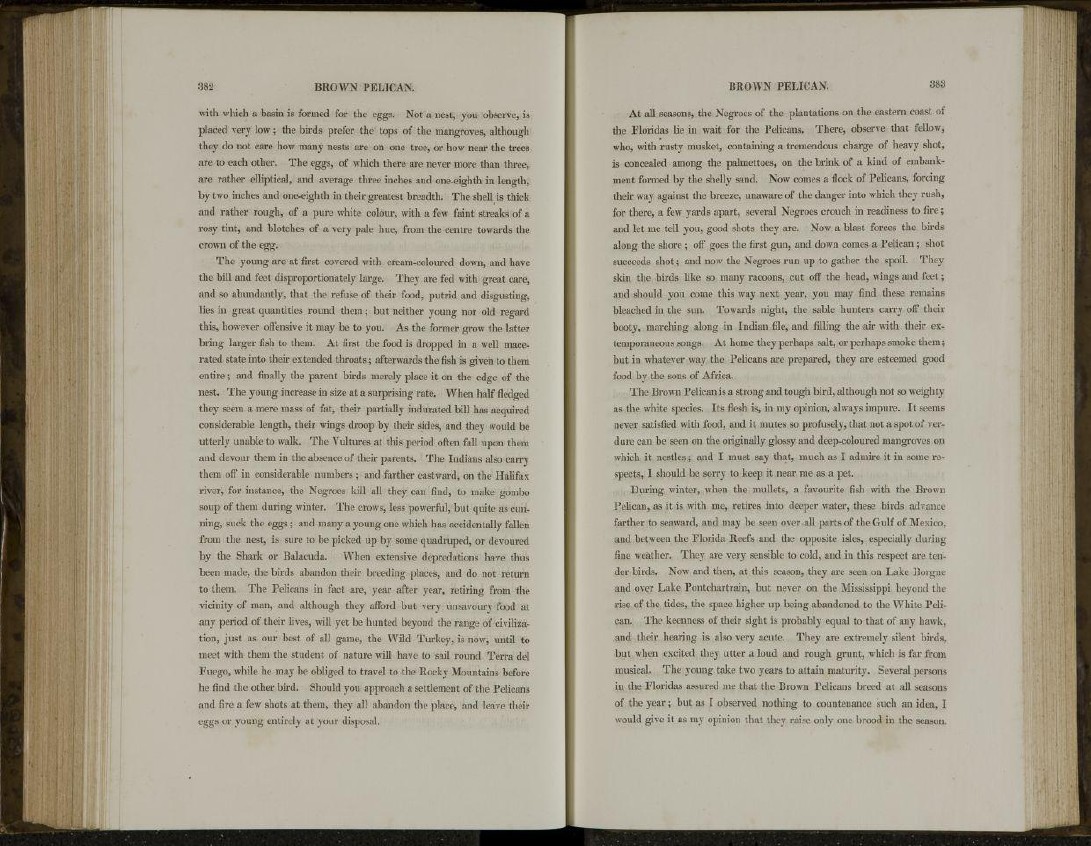
with which a basin is formed for the eggs. Not a nest, you observe, is
placed very low; the birds prefer the tops of the mangroves, although
they do not care how many nests are on one tree, or how near the trees
are to each other. The eggs, of which there are never more than three,
are rather elliptical, and average three inches and one-eighth in length,
by two inches and one-eighth in their greatest breadth. The shell is thick
and rather rough, of a pure white colour, with a few faint streaks of a
rosy tint, and blotches of a very pale hue, from the centre towards the
crown of the egg.
The young are at first covered with cream-coloured down, and have
the bill and feet disproportionately large. They are fed with great care,
and so abundantly, that the refuse of their food, putrid and disgusting,
lies in great quantities round them; but neither young nor old regard
this, however offensive it may be to you. As the former grow the latter
bring larger fish to them. At first the food is dropped in a well macerated
state into their extended throats; afterwards the fish is given to them
entire; and finally the parent birds merely place it on the edge of the
nest. The young increase in size at a surprising rate. When half fledged
they seem a mere mass of fat, their partially indurated bill has acquired
considerable length, their wings droop by their sides, and they would be
utterly unable to walk. The Vultures at this period often fall upon them
and devour them in the absence of their parents. The Indians also carry
them off in considerable numbers ; and farther eastward, on the Halifax
river, for instance, the Negroes kill all they can find, to make gombo
soup of them during winter. The crows, less powerful, but quite as cunning,
suck the eggs; and many a young one which has accidentally fallen
from the nest, is sure to be picked up by some quadruped, or devoured
by the Shark or Balacuda. When extensive depredations have thus
been made, the birds abandon their breeding places, and do not return
to them. The Pelicans in fact are, year after year, retiring from the
vicinity of man, and although they afford but very unsavoury food at
any period of their lives, will yet be hunted beyond the range of civilization,
just as our best of all game, the Wild Turkey, is now, until to
meet with them the student of nature will have to sail round Terra del
Fuego, while he may be obliged to travel to the Rocky Mountains before
he find the other bird. Should you approach a settlement of the Pelicans
and fire a few shots at them, they all abandon the place, and leave their
eggs or young entirely at your disposal.
At all seasons, the Negroes of the plantations on the eastern coast of
the Floridas lie in wait for the Pelicans. There, observe that fellow,
who, with rusty musket, containing a tremendous charge of heavy shot,
is concealed among the palmettoes, on the brink of a kind of embankment
formed by the shelly sand. Now comes a flock of Pelicans, forcing
their way against the breeze, unaware of the danger into which they rush,
for there, a few yards apart, several Negroes crouch in readiness to fire;
and let me tell you, good shots they are. Now a blast forces the birds
along the shore; off goes the first gun, and down comes a Pelican ; shot
succeeds shot; and now the Negroes run up to gather the spoil. They
skin the birds like so many racoons, cut off the head, wings and feet;
and should you come this way next year, you may find these remains
bleached in the sun. Towards night, the sable hunters carry off their
booty, marching along in Indian file, and filling the air with their extemporaneous
songs. At home they perhaps salt, or perhaps smoke them;
but in whatever way the Pelicans are prepared, they are esteemed good
food by the sons of Africa.
The Brown Pelican is a strong and tough bird, although not so weighty
as the white species. Its flesh is, in my opinion, always impure. It seems
never satisfied with food, and it mutes so profusely, that not a spot of verdure
can be seen on the originally glossy and deep-coloured mangroves on
which it nestles; and I must say that, much as I admire it in some respects,
I should be sorry to keep it near me as a pet.
During winter, when the mullets, a favourite fish with the Brown
Pelican, as it is with me, retires into deeper water, these birds advance
farther to seaward, and may be seen over all parts of the Gulf of Mexico,
and between the Florida Reefs and the opposite isles, especially during
fine weather. They are very sensible to cold, and in this respect are tender
birds. Now and then, at this season, they are seen on Lake Borgne
and over Lake Pontchartrain, but never on the Mississippi beyond the
rise of the tides, the space higher up being abandoned to the White Pelican.
The keenness of their sight is probably equal to that of any hawk,
and their hearing is also very acute. They are extremely silent birds,
but when excited they utter a loud and rough grunt, which is far from
musical. The young take two years to attain maturity. Several persons
in the Floridas assured me that the Brown Pelicans breed at all seasons
of the year; but as I observed nothing to countenance such an idea, I
would give it as my opinion that they raise only one brood in the season.